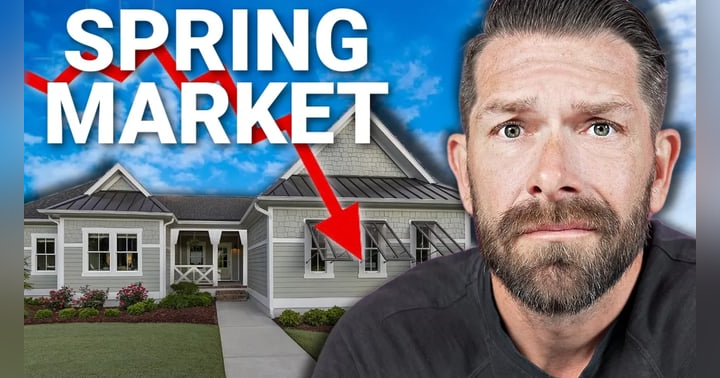TRUMP Is WRONG About Mortgage Interest Rates

```html
TRUMP Is WRONG About Mortgage Interest Rates
📅 Ready to find the right Realtor or loan? Start your stress-free journey today.
Last week, former President Donald Trump and FHA Director Bill Pulte publicly criticized Federal Reserve Chair Jerome Powell, demanding that interest rates be lowered by two to three percentage points. Trump even went so far as to say mortgage rates should "f--- off." But here’s the thing—
The Fed doesn't control mortgage rates. And believing otherwise reflects a fundamental misunderstanding of how financial markets work.
Who Actually Controls Mortgage Rates?
The idea that Jerome Powell can wave a magic wand and lower your 30-year fixed rate mortgage is a myth. While the Federal Reserve does influence economic conditions through the Fed Funds Rate, mortgage interest rates are determined by a wide range of market factors—not a single press conference or political demand.
Let’s unpack what actually determines mortgage rates, why Trump and Pulte have it wrong, and what this means for you as a homebuyer or homeowner in 2025.
The Fed Funds Rate vs. Mortgage Rates
The Fed Funds Rate is the interest rate banks charge each other for overnight loans. It influences short-term rates like credit cards, auto loans, and HELOCs. But mortgage rates are long-term and influenced by market forces—especially bond yields and inflation expectations.
Key Distinction: The Fed doesn’t set mortgage rates. The bond market does.
Why That Matters
- When the Fed raises or lowers the Fed Funds Rate, mortgage rates might respond—but not always in the direction you think.
- In fact, last year, the Fed cut rates by 1% over three meetings, yet mortgage rates went up. Why? The market had already priced in the cuts.
- This is a classic example of "buy the rumor, sell the fact."
The Price of Time: What Is Interest?
To understand rates, you need to understand interest. Author Edward Chancellor calls it "the price of time." If you borrow $400,000 to buy a home, you’re buying time—owning today instead of saving for decades. That cost is interest.
But lenders don’t lend for free. They need compensation for risk, inflation, and opportunity cost. That’s where rates come in.
7 Key Drivers of Mortgage Interest Rates
- Inflation Expectations: The biggest driver. If inflation is high, lenders demand higher interest to protect their returns.
- Bond Market Yields: Mortgage rates tend to follow the 10-Year Treasury. When Treasury yields rise, mortgage rates do too.
- Federal Reserve Policy: Yes, the Fed matters—but only indirectly through its influence on inflation and economic expectations.
- Employment & Wage Growth: A tight labor market can fuel inflation, which pressures rates higher.
- Consumer Spending: More spending means more inflation risk, again pushing rates higher.
- Government Debt & Spending: When the government issues more debt, it can push yields up, affecting mortgage rates.
- Term Premiums & Market Volatility: Long-term uncertainty (like political risk or global instability) leads lenders to charge more.
So Why Are Rates So High Right Now?
Mortgage rates are high because inflation, while declining, is still not where the Fed wants it—and because the Fed has pulled back on its support of the bond market.
Let’s break that down:
- Fed Balance Sheet: After years of buying mortgage-backed securities (MBS), the Fed is now letting those bonds roll off. That removes demand and puts upward pressure on rates.
- Increased Treasury Issuance: More debt = more supply = higher yields = higher mortgage rates.
- Uncertain Fiscal Policy: Neither party seems interested in cutting spending, which concerns investors and impacts long-term rate expectations.
What Trump and Pulte Get Wrong
Trump's call for a 2-3% rate cut isn't just misguided—it's potentially dangerous. Lowering the Fed Funds Rate that aggressively would juice the economy and likely re-inflate the very inflation we’ve been trying to contain.
Pulte, despite being in a leadership role over Fannie Mae and Freddie Mac, is wrong to suggest there's "no legitimate reason" for rates to be this high. Inflation is a reason. Market risk is a reason. Fiscal imbalance is a reason.
Oversimplifying the issue doesn't help consumers. It misleads them.
Will Mortgage Rates Drop in 2025?
Possibly. But don’t bank on it happening quickly. For rates to meaningfully drop, we need:
- Slowing economic growth
- Higher unemployment
- Declining inflation (closer to the Fed’s 2% target)
- Improved fiscal discipline from the government
Even then, there’s no guarantee. The market has to believe the slowdown is real and that inflation will stay tame.
What Homebuyers Should Do Right Now
Waiting for the perfect rate is a fool’s game. Focus instead on what you can control:
- Know your numbers: Budget based on today’s payments, not future speculation.
- Get pre-approved: Lock in your buying power now.
- Focus on the right home: The right home at the right price beats a low rate on a house you don’t love.
- Be ready to refinance: If rates drop in the future, you can refi. You can’t change the price you paid.
📅 Ready to find the right Realtor or loan? Start your stress-free journey today.
Final Thoughts
If you're waiting for Trump or any politician to "fix" mortgage rates, you're going to be disappointed. The real world of finance doesn’t work that way. But if you stay informed, understand the drivers behind interest rates, and plan smartly, you can make the right move regardless of what the Fed or any political figure says.
Don't let headlines or hot takes steer your financial future. Understand the fundamentals, control what you can, and make educated decisions.
📅 Take the Next Step
Want personalized guidance on your home buying journey? Whether you need a pre-approval, a trusted Realtor, or simply have questions about today’s mortgage landscape, we’re here to help.


